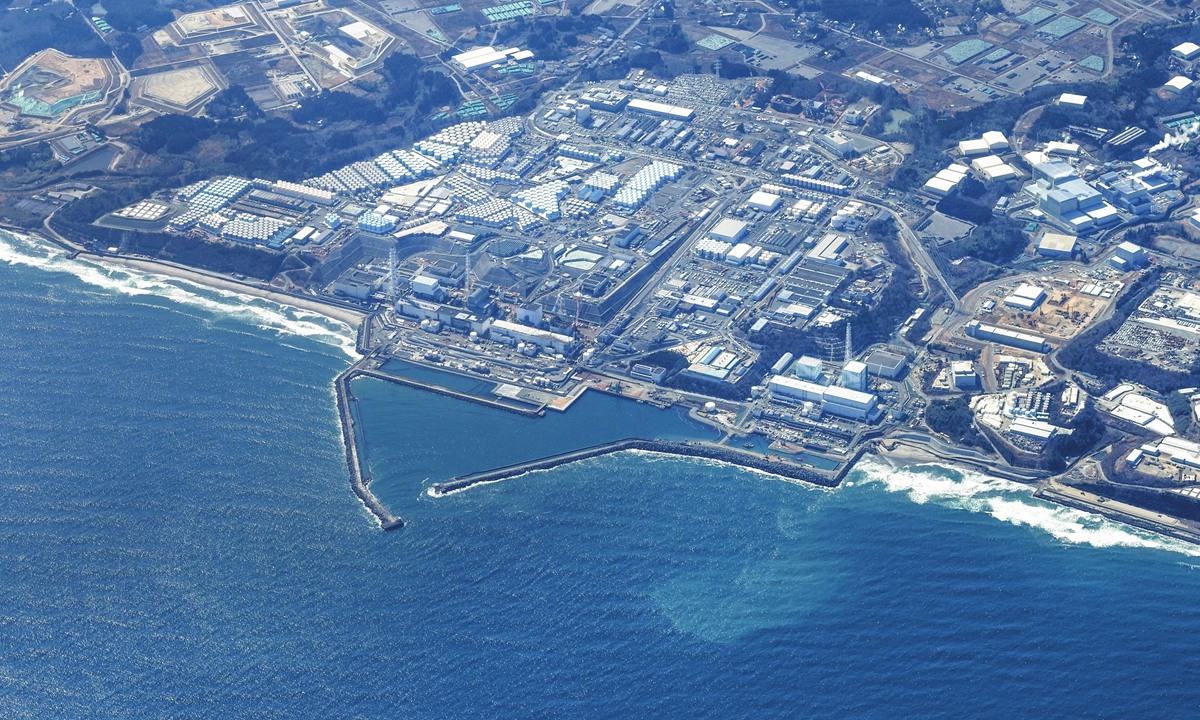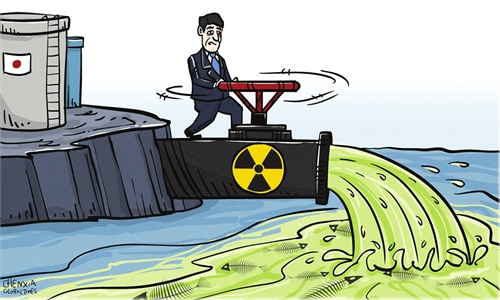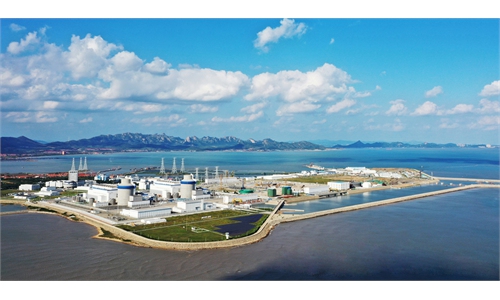Chinese FM rebukes Japan in shifting risk of nuclear pollution to all mankind through dumping nuclear-contaminated wastewater

An aerial picture shows Fukushima No. 1 Nuclear Power Plant in Fukushima, Japan in February 2023. The decommissioning plant will soon mark the 12th anniversary of the unprecedented meltdown after the earthquake and tsunami in 2011. Japan's plan to discharge nuclear contaminated water into the sea worries the regional countries and international community. Photo: VCG
The Chinese Foreign Ministry on Tuesday once again denounced that Japan's unilateral decision to dump nuclear-contaminated wastewater into the sea is trying to shift the risk of nuclear pollution to all mankind, warning the country of not starting the plan without full consultation with its neighbors and other stakeholders as well as relevant international institutions.
The remarks came after rallies were held in Japan and many other countries and regions across the world in recent days to protest against Tokyo's unilateral plan, during the 12th anniversary of the Great East Japan Earthquake and and the Fukushima Daiichi nuclear disaster on Saturday.
Also on Saturday, the Japanese Social Democratic Party said Japan must never return to the path of dependence on nuclear power and the nuclear-contaminated wastewater must not be released into the sea.
Commenting on the issue, Wang Wenbin, spokesperson for the Chinese Foreign Ministry, said at Tuesday's press conference that 12 years on, the Japanese government has failed to learn the bitter lessons from the Fukushima nuclear power plant accident.
Instead, it insists on pushing forward the plan to dump nuclear-contaminated wastewater in an attempt to shift the risk of nuclear pollution to all mankind.
This is by no means a move by a responsible country and runs counter to Japan's due international obligations, Wang condemned.
Wang said that the to-be-discharged Fukushima wastewater amounts to more than 1.3 million tons, containing more than 60 radionuclides, and if the water is dumped it will spread to the global sea in the next 10 years, and have an incalculable impact on the global marine environment and human health.
Wang cited some Japanese media commentaries as saying that Japan chose a shortcut to put its economic interests first over the issue in the face of imperfect scientific discussion and inadequate communication with the public.
The National Federation of Fisheries Cooperatives Associations of Japan and other civil organizations have strongly criticized Tokyo for breaking its promises and ignoring the interests of fishermen. The simple and crude actions further intensified the public's concerns and panic, Wang noted.
According to a Japanese poll, 43 percent of the public are opposed to the nuclear-contaminated wastewater discharge, and more than 90 percent believe that the move will cause negative effects. The Japanese government cannot even convince its own people, let alone win the trust of the international community, Wang said.
Separately, professional departments of China and Russia have twice raised joint questions to the Japanese side from a technical point of view, but Japan has not given sufficient and credible response, Wang revealed.
Wang said that the Japanese government's push for the plan is a direct disregard of the sovereignty and self-determination of Pacific countries, noting that people in the Pacific have a fundamental right to a clean, healthy and sustainable environment.
According to Wang, the Pacific Islands Forum called on Japan to postpone the release of contaminated water, saying that Tokyo Electric Power Co 's test data cannot be used as a basis for deciding on the discharge.
On the one hand, the Japanese government has repeatedly stated that it will not start the sea discharge until it has obtained the understanding of stakeholders. On the other hand, it has turned a deaf ear to the legitimate concerns of the international community and domestic people, and has persisted in approving the sea discharge plan, declaring that it will start in the spring and summer and this cannot be extended any longer, Wang said.
Such inconsistent actions by Japan show no sincerity in addressing the concerns of stakeholders, Wang criticized.
We once again urge Japan to face up to the legitimate concerns of all parties, earnestly fulfill its international obligations, accept strict international supervision, dispose of nuclear-contaminated water in a scientific, open, transparent and safe manner, including studying alternative disposal options, and refrain from releasing the water until full consultation is reached with its neighbors and other stakeholders as well as relevant international institutions, Wang stressed.
Da Zhigang, director of the Institute of Northeast Asian Studies at Heilongjiang Provincial Academy of Social Sciences, expressed his deep concern over the issue on Tuesday as well. He told the Global Times that the neighboring countries and regions may also react immediately if the plan is implemented, such as suspending the sea products imports from the involved regions of Japan. And it's possible that the other countries and regions will follow suit, Da warned.
As seafood from Fukushima and nearby Japanese prefectures is mainly affected, China's Hong Kong Special Administrative Region government said it would step up testing of food imports from Japan and may suspend imports of seafood from the Fukushima area, according to local media outlet Oriental Daily on Monday.



